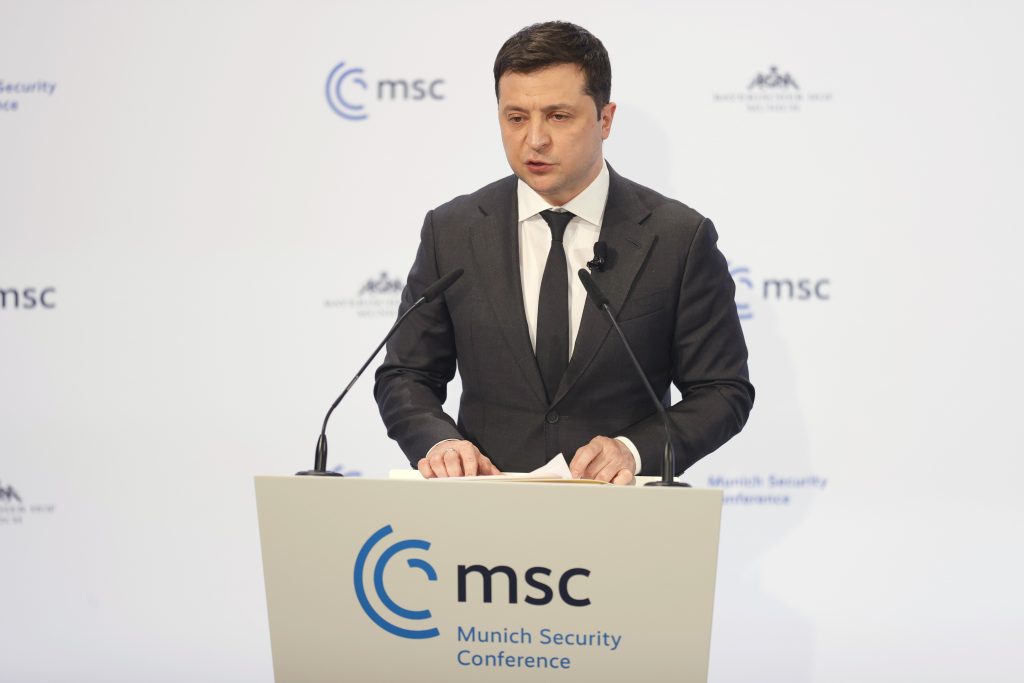Russia’s preparations for a major assault on Ukraine could result in a conflict with “millions of casualties” and lead to a third world war, according to Ukrainian President Volodymyr Zelensky, who accused the luminaries of the trans-Atlantic alliance of adopting an “appeasement” policy that has failed to constrain the Kremlin.
“The security architecture of our world is brittle. It is obsolete,” Zelensky said Saturday. “Some countries are committing crimes while others resort to indifference — the indifference that turned them into accomplices.”
If Zelensky’s mere appearance at the Munich Security Conference came as a surprise to attendees — he faced questions about “leaving your house unguarded,” as CNN’s Christiane Amanpour put it, with Russian forces poised to attack — his message was even more bracing. In Zelensky’s telling, the war in Ukraine had exposed the “arrogance and irresponsibility” of a Western foreign policy elite that hid its failures behind a facade of self-congratulatory sanctimony.
“It is symbolic that I’m saying this here,” Zelensky said as he recalled that Russian President Vladimir Putin unveiled his plan for “putting the challenge to the global security” at the 2007 Munich Security Conference. “How did the world respond? Appeasement.”
The speech put Zelensky in the position of rebuking Ukraine’s more powerful allies, while also needing their additional assistance. So he avoided, for the most part, identifying the targets of his criticism by name: “I don’t want some countries to be ashamed,” he said through an MSC interpreter.
He, however, made an exception for former German Chancellor Angela Merkel, who was dubbed “the leader of the free world” during Donald Trump’s presidency, but orchestrated the construction of the Nord Stream 2 gas pipeline from Russia to Germany in defiance of U.S. and Eastern European warnings that this project would enhance Putin’s power to threaten Ukraine.
“It was here three years ago when Angela Merkel said, ‘Who can pick up the pieces of the world’s puzzle? Only all of us together,’ she said, to a rush of audible excitement in the room, which stood up to applaud,” Zelensky said, recalling Merkel’s speech at the 2019 conference. “Unfortunately, the collective ovation failed to transform into collective action. So, now the world is talking about the threat of a big war.”
Zelensky proposed to meet with Putin in order to find a “diplomatic path for the sake of a peaceful settlement.” Yet Russian officials have insisted that Ukrainian officials negotiate with their proxies in the Russian-held territory in eastern Ukraine, as Moscow seeks to implement a moribund peace deal that the Kremlin regards as a key to long-term political influence in Ukraine.
Ukrainian opposition lawmaker Ivanna Klympush-Tsintsadze, who chairs the Ukrainian parliament’s committee for integration into the European Union, suggested Zelensky has overestimated his “ability to agree with Putin” from the earliest days of his presidency.
“He has believed that it’s possible to have a real substantive dialogue with Putin and it’s possible to have kind of a reset,” she told the Washington Examiner, in a nod to the Obama administration’s effort to recalibrate America’s relationship with Russia upon taking office in 2009. “It’s a problem that the new Ukrainian leadership, in the fifth year of war, [was] making that mistake.”
Yet she echoed his criticism of Western leaders. “Every single German government that is coming in also hopes that they can sign a deal with the Russian Federation, come back to business as usual, and ensure that they are keeping the business ties that would not affect their economy and their citizens,” she told the Washington Examiner during an interview on the sidelines of the Munich conference.
Zelensky has endured a tumultuous relationship with Western leaders since his victory in the 2019 presidential elections. A former comedian whose television satire of Ukrainian corruption proved so popular that it catapulted him into office, Zelensky found himself embroiled at a critical juncture in Ukrainian history in the contest between Trump and his top rival for the presidency, Joe Biden. Former New York Mayor Rudy Giuliani maneuvered to pressure Zelensky into announcing an investigation that would taint Biden with allegations of corruption, a demand that presented Zelensky with a choice between receiving much-needed military and political assistance a limited war with Russia and alienating the congressional Democrats who ensure that the U.S.-Ukraine partnership has bipartisan support in Washington.

Giuliani’s scheme was exposed before Zelensky acquiesced to the demand. Biden’s subsequent victory brought a more enthusiastic advocate of Ukraine into the White House, but even Biden’s support has created frustrations for Zelensky, who acknowledged Saturday he believes the U.S. practice of describing Putin’s apparent intentions to launch a war could make his country even more vulnerable to an attack.
“We cannot say on [a] daily basis that war will happen tomorrow,” Zelensky told Amanpour when asked why he has not echoed the Biden team’s predictions about an “imminent” invasion. “Can you have stability in that kind of country? No. And those who want to dis-balance our country from within are multiple, and everyone wants Ukraine to be weak — weak economy, weak army, and if there’s [a] weak army, you can just go ahead and invade and we won’t be able to protect, neither our people, neither our children, neither [our] economy. This is why our response is very calm.”
Zelensky suggested Russian popular opinion might prevent Putin from initiating an operation “to start to go to war against Ukraine,” although he acknowledged the threat presented by the surge in “provocations” by Russian proxies in the Russian-occupied territory of eastern Ukraine. “We are not living in denial. We understand what can happen tomorrow,” he said.

That danger, Zelensky reminded the audience, stems from Ukraine’s agreement to surrender the nuclear weapons that it inherited from the late Soviet Union. That deal, known as the Budapest Memorandum, led Ukraine to disarm in exchange for security guarantees from France, the United Kingdom, the United States (NATO’s three nuclear-armed members), and Russia. “We no longer have that weapon, neither do we have security,” Zelensky said.
This weekend marks the eighth anniversary of then-Ukrainian President Viktor Yanukovych’s violent attempt to suppress a pro-European Union protest, Zelensky noted, which led to the deaths of 100 protesters and Yanukovych’s abrupt removal from office by the Ukrainian parliament. Those protests erupted after Yanukovych yielded to Russian demands that he suspend an association agreement with the EU. Kremlin officials wanted Ukraine, instead, to join an economic bloc with Russia and other countries that gained independence through the collapse of the Soviet Union but remained aligned with Moscow.
Russia is trying to convince Ukrainians “that no one is waiting for us in Europe,” according to Zelensky, who argued that Western leaders should allow Ukraine to make progress toward membership in the EU and NATO despite Russian attacks.Zelensky also urged the U.S. and the EU to impose sanctions on Russia before Putin invades despite the Biden team’s argument that the imposition of sanctions prior to an attack might lead Putin to conclude that he has little else to lose by launching the offensive.

Zelensky acknowledged he doesn’t believe Western leaders will follow through on their promise to punish a prospective invasion. “If you can’t even disclose what will happen to whom if the war starts … I doubt that it will be triggered after [the war] even happens,” he told Amanpour.
A failure to break the habits that created his perception of Western foreign policy attitudes, he suggested, could have devastating consequences.
“The security architecture of Europe and beyond is almost destroyed. It’s too late now to talk about fixing it. It is high time for a new one,” Zelensky said through an interpreter. “Mankind did so on two occasions, having paid an extensively high price as the two world wars. We do have a chance to break that trend … and build a new system before we pay millions of casualties, based on the experience of two world wars, without the third one to come in.”
Source: Washingtom Examiner



